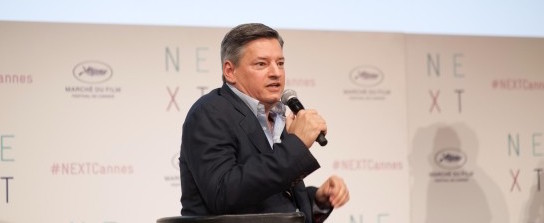Move over Harvey Weinstein; one of the most courted and controversial figures on the Croisette this year was none other than Netflix’s content chief Ted Sarandos.
Speaking at an “In Conversation” session (May 15) at the Cannes Marche du Film’s NEXT conference, Sarandos tried his best to allay fears that Netflix poses a major threat to Europe’s delicate film financing and distribution system.
At one point, a French reporter asked if Sarandos was aware that “within five to 15 years, the Netflix model would destroy the film ecosystem in Europe”. Local concerns include the fact that Netflix is dismantling the traditional system of distribution windows and does not contribute to European subsidy systems as European broadcasters do.
Not one to shy from the spotlight, Weinstein was sitting on the front row of the event and leapt up to defend Sarandos, describing the company as “visionaries”. He also bashed the European subsidy system and said that one million Netflix subscribers in the US watch French films, while the US networks rarely acquire foreign movies.
Sarandos said that Netflix would “grow the European film ecosystem” by giving local filmmakers a global platform.
Naturally, The Weinstein Company (TWC) is already in bed with Netflix via an exclusive, multi-year deal that gives the streaming service the premium pay-TV window for TWC and Dimension films. The two companies have also collaborated on Marco Polo and Crouching Tiger, Hidden Dragon 2.
Chime connect has summarised the other major points of this lively discussion:
THEATRICAL DISTRIBUTION
Sarandos said that Netflix wants to work with theatres to release films simultaneously day-and-date with their streaming debut: “Nothing we are doing is anti-theatres. We are pro movies. Nothing on Netflix can compete with wanting to go to the movies with your girlfriend. But if you don’t want to put your shoes on, nothing in the theatres can compete with Netflix.”
He also described France’s theatrical window of 36 months as too long and said Netflix won’t release its movies in French cinemas until the law changes.
BACKEND PAYMENTS
Sarandos defended Netflix’s refusal to pay royalties to producers, preferring instead to buy out new titles with an upfront premium: “All the films we do at Netflix will be profitable to the producer, there will be a premium to the budget…We try to compensate via what we think the backend would have been.”
Referring to Netflix’s monthly subscription rather than transactional model, he added: “There is no backend because there is no incremental revenue we are earning off that.”
Chime comment: Netflix’s strategy differs from Amazon, which pays producers back-end should their films turn a profit. Amazon is also more respectful of windows, albeit shortened ones, while Netflix aims to stream films day-and-date with their theatrical release.
ACQUISITIONS
Sarandos said he preferred to buy out content in development/production rather than acquire rights to the finished product. He is looking to finance films in the medium-budget range, although he’d go over $50m in some cases. He observed that medium-budget films in North America often lose money in traditional distribution due to the huge costs of P&A.
“An output deal with a US studio costs around a billion dollars – for that same billion dollars we can invest in a slate of original films that can compete in terms of A-list actors and directors around the world,” Sarandos said. “Then we don’t have to wait 10-12 months and hope the studio markets it well.”
LOCAL-LANGUAGE PRODUCTION
Sarandos suggested Netflix would also finance local-language film production. In France, it is already producing a TV series, political drama Marseille.
Chime comment: This could prove tricky for Netflix in some territories as Sarandos also said the company doesn’t want to sell off any territories for original content – it wants the world. In most Asian territories, the local producer wants the world. And in China, most new projects don’t need Netflix’s money. Which brings us to…
CHINA
A few months ago, Sarandos said Netflix would try to enter the China market alone as partnerships were too difficult to pursue. However, around the same time as his Cannes talk, Netflix’s stock surged on rumours that the company is in talks with several potential China partners, including Wasu Media.
At the NEXT event, Sarandos confirmed the company hopes to enter China, but didn’t elaborate beyond observing that Chinese consumers are already aware that House Of Cards is a Netflix show.
Chime comment: Netflix needs a local partner in China to secure an operating licence and will face tough competition from deeply-entrenched local streaming platforms that offer content free to consumers. In addition, China’s VOD sector is grappling with new regulations, introduced April 1, that require all content to be censored.

